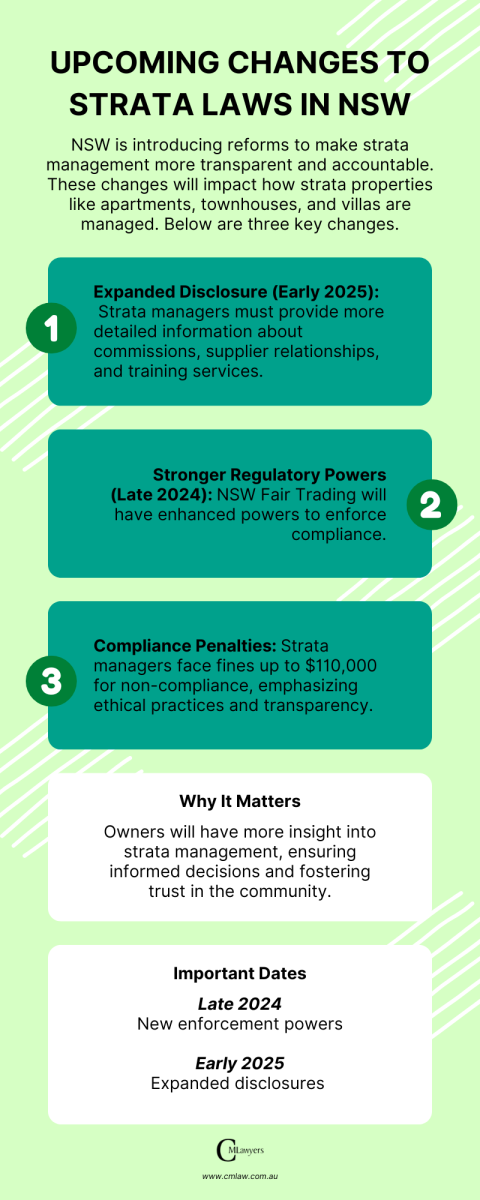Upcoming Changes to Strata Laws in NSW: What You Should Know
At our law firm, we’re here to support you through the upcoming changes to strata laws in New South Wales. The NSW Government is rolling out some exciting reforms aimed at making the management of strata-titled properties—like apartments, townhouses, and villas—more transparent and accountable. These updates will help shape how strata schemes are run and how owners corporations work with their strata managers.

Key Changes Coming Soon
Exciting updates are on the horizon that will enhance the way strata properties are managed. These changes aim to foster a more transparent and accountable environment for both property owners and strata managers, ensuring everyone is better informed and empowered in their roles.
Expanded Disclosure Requirements for Strata Managers
Starting in early 2025, strata managers will need to share more detailed information with owners corporations. This includes insights into their relationships with suppliers, commissions they earn, and any training services they utilize. With this enhanced transparency, owners corporations will be better equipped to evaluate the performance and interests of their strata managers.
Stronger Regulatory Powers for NSW Fair Trading
Beginning later in 2024, NSW Fair Trading will have improved enforcement powers to oversee strata management practices. This means they can ensure that strata managers follow the new disclosure requirements, focusing on protecting property owners and promoting transparency in insurance arrangements and supplier relationships.
Reforms Based on the 2021 Statutory Review
These changes are based on recommendations from the 2021 statutory review of strata laws. The initial phase of reforms was introduced in 2023, and these latest updates continue to address the evolving needs of strata communities across NSW.
Why These Changes Matter to Property Owners
For strata property owners, the upcoming changes to the laws are a significant step forward in enhancing the overall management of their properties. These reforms are geared towards improving decision-making processes by ensuring that strata managers provide more frequent and clear information.
With these new requirements, you can expect timely updates on crucial aspects such as insurance coverage, commissions earned by strata managers, and relationships with suppliers. This means you will have access to detailed insights that were previously less transparent, allowing you to make informed decisions about your property.
Moreover, increased transparency fosters a sense of accountability among strata managers. As an owner, you’ll be empowered to ask questions and engage more actively in discussions about the management of your strata scheme. This collaborative approach not only helps in addressing concerns promptly but also builds trust within the community.
Ultimately, these changes aim to give you greater control over your investment, ensuring that your interests are prioritized and that you are fully informed about how your strata scheme is being managed. By having access to comprehensive information, you can contribute to a more effective and harmonious living environment for all residents.
Compliance and Penalties for Strata Managers
Strata managers will face stricter obligations under the new laws, which are designed to enhance accountability and transparency within the strata management sector. These regulations aim to ensure that strata managers act in the best interest of owners corporations, promoting ethical practices and clear communication.
Failure to comply with these new disclosure requirements could lead to significant penalties, with fines reaching up to $110,000. This substantial financial consequence underscores the seriousness of adhering to the new rules and the importance of maintaining trust in the management of strata properties. Strata managers must familiarize themselves with these changes and adjust their practices accordingly to avoid potential repercussions.
In addition to financial penalties, non-compliance may also result in reputational damage, as owners corporations become increasingly vigilant about the management of their properties. Strata managers who engage in unethical practices, such as undisclosed commissions or conflicts of interest, risk losing their licenses and facing legal action. Therefore, it is essential for strata managers to not only understand these new obligations but also to implement robust systems for compliance and transparency. By doing so, they can protect their professional standing while fostering a more trustworthy environment for property owners.
Important Dates to Remember
Mark your calendars! These key dates are crucial for ensuring that you and your strata management team are prepared for the upcoming changes, allowing for a smooth transition and continued compliance with the new regulations.
- Late 2024: NSW Fair Trading’s enhanced enforcement powers will come into effect.
- Early 2025: Expanded disclosure requirements for strata managers will begin.
As these dates approach, it’s essential to understand how these changes may impact your rights and responsibilities as a property owner or strata manager.
Embracing Change in Strata Management
As the landscape of strata management evolves with these upcoming changes, it’s essential for both property owners and strata managers to stay informed and proactive. Embracing these reforms not only enhances transparency and accountability but also fosters a more collaborative environment within strata communities. At CM Lawyers, we are committed to guiding you through this transition, ensuring that your rights are protected and that you are well-equipped to navigate the new regulations. If you have any questions or need assistance, don’t hesitate to reach out. We're here to help!



